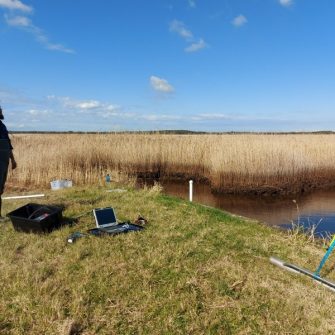Wetland restoration

WRL is at the cutting edge of the science and engineering of wetland restoration and rehabilitation. We have completed many on-ground projects to rehabilitate, repair and restore large wetlands across Australia.
WRL scientists and engineers can provide a range of expert services to assess and restore both tidal and riverine wetlands. Our researchers understand the environmental issues behind the observable problems and have a track record of developing tailored, on-ground solutions to stimulate functional wetland recovery.
While our particular expertise is focused on hydrologic and physical aspects of wetland restoration, we collaborate with a team of flora and fauna experts to complement our skills.
Example projects
-
Winner of the 2015 Green Globe Award for Natural Environment Sustainability, this ongoing project has determined priority areas for wetland creation at Big Swamp, detailed innovative on-ground methods, modelled flooding impacts and undertaken large scale on-ground works to restore/create new wetlands.
-
A restoration plan and scope of works were developed to rehabilitate Yarrahapinni Wetlands National Park. A hydrodynamic modelling project was also undertaken to guide onground engineering works and determine the ideal method for restoring tidal flushing onsite.
-
Undertook a range of investigations to develop and design 3 tidal wetland ponds and feeder channels including soil analysis, RTK surveying (quad bike) and numerical modelling of creek channel.
-
WRL examined the characteristics of a large channel (and associated wetlands) of the Mehi River located near Moree, NSW. Field investigations and numerical modelling provided an indication of the volume required to restore the wetland system and maintain ecosystem processes.
-
WRL has been involved in all phases (over 9 years) of a large successful wetland restoration program including soil analysis, SmartGate design/construction, levee and culvert design, earthworks, advanced monitoring, modelling, etc.
Tomago Wetland restoration project
-
WRL staff examined a range of potential tidal restoration sites and installed modified automated gates at 5 sites. The restored sites had significantly improved water quality. Additional prioritising of the entire floodplain for remediation is ongoing.
-
WRL undertook field studies of subsurface flow, and numerical modelling to assess potential impacts of groundwater pumping on coastal salt marsh and freshwater wetlands. State-of-the-art mini-piezometers were deployed to identify vertical flow gradients.
-
WRL staff assisted detailed planning and undertook model assessment of a range of works aimed at enhancing inundation of high value floodplain forest and wetland areas.
-
WRL staff assessed the source of acidic pollutants within a large contaminated site to assess optimal restoration strategies. Study involved detailed monitoring of various sub-catchments during flow events and quantifying pollutant loads.
-
WRL staff have examined the data available to restore flows to the large inland system and assessed the requirements for conducting numerical modelling of flow hydrodynamics. Staff are also assisting NSW DECC with umbrella review of modelling undertaken for the wetland recovery program.
-
Located near Port Stephens, this study assessed the impact of restoring tidal flows and installing water control structures to a series of flood mitigation drains contaminated with acid sulphate soils using field data and numerical modelling techniques. Additional work is ongoing.
-
WRL staff have an on-going role of providing high-level expert advice to the Federal Department of the Environment and the Murray Darling Basin Authority concerning developments near Ramsar Wetlands. WRL’s advice has largely been concerned with the hydrological impact to surface and groundwater of large developments near Ramsar Wetlands including nearly every state and territory in Australia.

